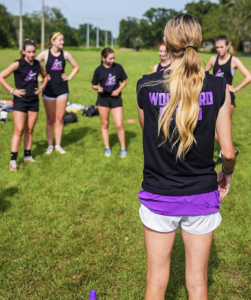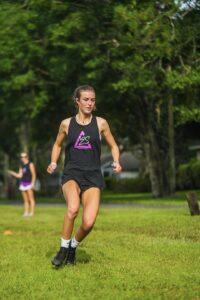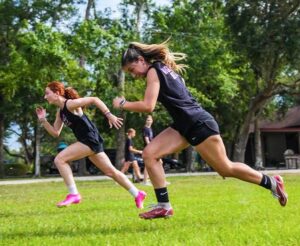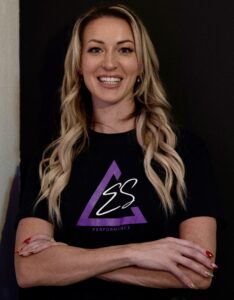
28 Mar Youth Female Athletes Must STOP Focusing On The Outcome of Speed and Have a DEEPER WHY!
I got on a Zoom call with my sprint and nutrition coach before I began my six month training plan with her in preparation for the World Track Championships with Team USA.
Tearing up on the call, I told her, “I want to compete in this because I want my health back.”
A few years prior, I suffered an incredible amount of health duress that ruined me. I won’t get into it much, but 2023 was the hardest year of my life. Fatigue, brain fog, rapid weight loss, insomnia, gut distress, hormonal issues, and more, I was in a rock bottom place with debilitating symptoms that held me back in my day-to-day life.
You see, competing with Team USA in the 60 meter sprint event this year in 2025 wasn’t about winning a medal, or getting a certain time in my event. It was about a deeper why: getting my health back so I can continue to serve.

What’s Missing in Youth Sport Performance
You see youth athlete performance and speed programs are advertised all over the internet with captivating slogans like “get faster!” “improve speed times!” or “get D1 speed!”
I mean I get it. If these trainers marketed about falling in love with the process and doing the mundane things, no one would sign up. Who wants that?? People would yawn and move onto the next speed guru.
Youth athletes (and sports parents) of today want everything RIGHT NOW. They want to be the best, the fastest, and the fittest. They want results fast. Instant gratification culture is the worst it has ever been and it’s ruining the next generation.
Though this doesn’t sound sexy or make me millions as a coach, it’s not about the outcome.
It’s not about being the best. It’s about being BETTER.
It's not about being the best. It's about being BETTER. Share on X

Better for yourself. Better than who you were yesterday. Better than who you were a year ago. Have you gotten stronger, faster and fitter for you?
Because the truth is, when you compare to your teammates and opponents, there will always be girls faster, stronger, and more explosive than you. That’s just how the youth sports market works. It’s a competitive cauldron. When you compare against others, there’s bound to be someone better than you in something.
You’re not always the best. Some days, you’ll feel totally incompetent and like a failure compared to the amazing athletes around you. Some days, you’ll miss the mark. Some days, you might not get your goal. And then other days, maybe you do. But when you do, that outcome is so fleeting and it’s over in a flash. So what now?
Then, the question isn’t ‘did I get the outcome I wanted?’, rather, it’s ‘did I become better than who I used to be?’
We need to teach young people this more. We need to teach them that life isn’t about the outcome, but it’s being on the journey of better. And despite wins, losses, and minor setbacks and everything in between, are you even 1% better than yesterday?
We need to teach young people this more. We need to teach them that life isn't about the outcome, but it's being on the journey of better. Share on XIt’s not about the outcome. It’s not about the scholarship. It’s not about the championship trophy. It’s not about wedding day.
It’s about what you do in the mundane day-to-day to become a better human, athlete, sister, girlfriend, and/or spouse. Because the outcomes are fleeting, and the process is the pleasure.
Because the outcomes are fleeting, and the process is the pleasure. Share on XYour WHY Matters
Why are you training? Why do you play your sport? Is it for selfish reasons? Is it superficial? Do you just want to play in college or score more goals?
Or, cue cringe, is it because your mom or dad want it for you? Well, you’ve already failed right off the bat if this is your why.
Is it because your mom or dad want it for you? Well, you've already failed if this is your why. Share on XOr maybe, when you peel the onion back and ask yourself deeply why you do your sport it’s because:
– You want to help your teammates
– You want to be a part of something great
– You want to glorify God (I’ve recently heard a girl say this and I loved it!)
Or maybe, when you sit with more introspection, you want to get faster because:
– You LOVE training speed and working out because it makes you a healthier and happier human to be around
– You feel committing to a speed program teaches you lifelong healthy habits
Whatever the why, it has to be something deep and meaningful.
Otherwise, you won’t love the process. You will give up the moment you fail. Or, you’ll get frustrated when you don’t see DRASTIC results instantly. You will freeze when adversity strikes. And worst yet, you will give up.

Stop Focusing the Outcome and Being the BEST
I just recently had an athlete grumble to me after a meager 4 weeks of starting a speed program, “I don’t see any drastic improvements yet.”
If you can imagine, this frustrated me several reasons. First, I just finished a grueling six months of training at the highest level for Team USA track. In six months, I strength trained and did sprint work multiple times a week, never deviated from my nutrition plan, prioritized sleep and recovery, and brought intensity and intent to every workout.
Expounding further, in six month’s time, I shaved only a FEW MILLISECONDS off of my 60 meter time. But in the track world, this is a huge deal. And more so, in field-based sports like soccer, lacrosse, and field hockey where every separating step matters. Any little improvement matters for speed.

I think what this girl expected was to all of a sudden be the fastest on her team, or be out-running literally everyone on the field, rather than seeing how far she has come on her own terms. And she has already come far. For being a former chronic endurance athlete, looking at her own speed technique and times, she has improved for herself.
For me, had I compared to the jacked lifelong track athletes in the racing lanes next to me, I would’ve been grossly disappointed. But I zoomed out and realized:
1. I was new to professional track.
2. I improved for myself.
3. I was better than I was six months ago when I began training.
Just because you begin a revolutionary speed program doesn’t mean you’re going to be the BEST. Or see anything DRASTIC in a month’s time.
Young female athletes need to take a step back, zoom out, and look at their small wins, even if they’re only a little bit faster than before, that’s incredible!
Speed development is a long-term pursuit that girls must chase for the length of their sports careers. No quick fix, folks.
Speed development is a long-term pursuit that girls must chase for the length of their sports careers. No quick fix, folks. Share on XFaster Ate Age 35
Speaking of no quick fix, I’ve been on this speed journey since I was a teenager. And because I continued to stick with it, refine my training, and dial in on my nutrition, I am now FASTER AT AGE 35 than when I was 21-years-old as a College All-American. I didn’t think it was possible, but anything is with consistency.
What’s even more important here is I’ve not just chased speed, I’ve mainly chased health.
Coming back to my initial zoom call with my sprint coach, I competed with Team USA to become the healthiest woman I can be.
I tracked my body composition and muscle mass, my blood work, my menstrual cycle, and so much more, and the health benefits that have come from consistency have been the most fulfilling. I talk about it more at length here:
At the World Masters Track Championships, I ended up placing in the middle of the pack for the 60 meter event and even though I didn’t win a medal, I’m glad I won back my health.
My symptoms are totally gone. My thyroid is normal again, my vitamin D levels are in range, my blood sugar controlled, my negative menstrual cycle and gut symptoms are completely gone, and my body has the most lean muscle mass to date. In the past six months, I have added 10lbs of muscle mass which is a big deal for someone who was losing weight rapidly when I was ill.
I can live life optimally again.

Since my deeper why to speed training was overall health, I truly enjoyed the process of doing my strength training early in the mornings, focusing on every rep, cooking my meals, taking the right supplements to address nutritional deficiencies, and making sure I was recovering hard to get the most benefit from intense speed workouts.
Competing with Team USA has inspired me to spread this message to young female athletes more: that you must love the process of speed. Whether you win or lose in your event, or are the fastest or not the fastest on your team, you should be proud of yourself for improving a little each day.
And when you enter the real world after sports end, you must take this mindset with you. Because there will always be people who are a better doctor, lawyer, teacher, nurse, business owner, and coach than you. But that doesn’t mean you give up and surrender when you feel like a failure who isn’t getting anywhere.
No. This means you continue to master your craft, ask yourself what is your deeper why, and continue to show up and serve others. You stick it out until the end.
You will never be the best in everything you do, which is why better must always be the goal.
ABOUT THE AUTHOR

Erica Mulholland is a former college 3x All-American soccer player and now Hall of Famer from Johns Hopkins University. She holds a Master of Science in Exercise Science and has been helping female athletes of all sports with speed, agility, strength, power, and conditioning for over 13 years. She has worked with soccer, lacrosse, track, volleyball, softball, and basketball girls, and has inspired her athletes to strength train not just for sport, but for life.
Do speed, strength and agility training with Erica in Lutz and Land O Lakes Florida, BOOK YOUR ASSESSMENT HERE
Need more personalized help from Erica? BOOK A CONSULT HERE

Interested in Remote Training for Female Athletes? BOOK A CONSULT HERE
Get Erica’s first book THE STRONG FEMALE ATHLETE
Get Erica’s second book FEMALE ATHLETE HIGH PERFORMANCE

Check out her podcast: The Strong Female Athlete


No Comments